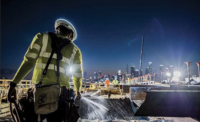Commentary: Seven Ways We Can Afford to Fix American Infrastructure
Technology exists to anticipate bridge remediation years before rust, corrosion, and cracks in the structure appear. The federal government needs to provide states with funds to purchase this equipment and train their inspectors to use it. Enabling bridge inspectors to ensure precision and objectivity in their evaluation process, which in turn allows us to catch problems earlier when they are easier and cheaper to fix, can save state governments countless millions of dollars a year in unnecessary remediation costs.
• Raise the gas tax. The federal gas tax has not been raised since 1993. It’s absolutely time to give serious consideration to increasing the federal gas tax. Most importantly, we must require that infrastructure funds collected via an increase in gas taxes be allocated for repairing the nation’s dilapidated roads and bridges.
• Increase the use of public-private partnerships (P3s). It is time to actively incentivize private investors to assist in making our failing infrastructure strong again. First, of course, we must take the right precautions.
We will have to ensure that there is a balance of competing governmental and private profit-seeking interests in P3 projects. We will also need to ensure that the proper financial advisors are sitting on the side of state and federal officials to balance out the experts who advise these private investors.
By taking the right steps, we can devise several workable models to use P3s to improve the nation’s infrastructure while still protecting the traveling public from excessive toll rates and ensuring that the interests of truckers, railroads, union workers and the towns and cities along those routes are fairly heard and balanced into the equation.
• Incentivize state and metro “remediation first” infrastructure projects. As Congress takes up reauthorization of the nation’s surface transportation law, they should encourage support for states and cities willing to form a new partnership with the federal government.
These partnerships should incentivize metropolitan areas to raise revenues for long-term regional funding of needed projects that will reduce congestion in our 100 largest cities. These “remediation first” projects, where states allocate funding to the maintenance of existing systems, will also create as much as 17% more jobs than applying the same funds to new projects.
• Cap construction cost overruns. Construction exigencies are going to occur, but the process for identifying them and quantifying them can be improved. Through sophisticated negotiations, agreement on a true fixed cost for a project—one that factors in negotiated costs for potential contingencies—can be secured before construction begins.
We can identify risks that may arise and secure agreement from contractors on pricing that caps potential cost increases and prevents unwarranted cost overruns. With this kind of reliable information in hand, cost-conscious politicians could begin to make the right decisions.
Barry B. LePatner is the founder of the New York City-based law firm LePatner & Associates LLP and the author of several books on the construction industry.




